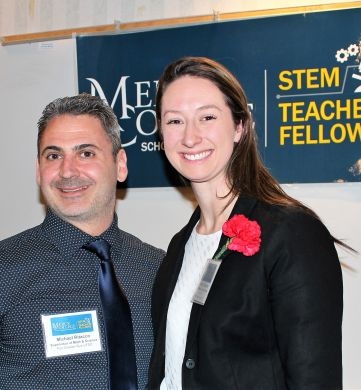Mercy College recognizes first cohort of STEM Master Teacher Fellows
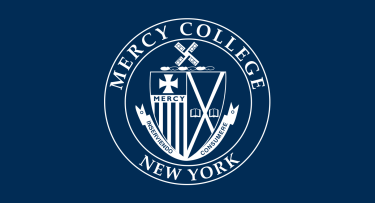
In January, Mercy College held a reception to welcome the first cohort of seven STEM Master Teacher Fellows and introduce them and the initiative to the Mercy community. This fellowship is the latest in a series of programs funded by the National Science Foundation aimed at meeting the nation’s growing need for trained K-12 educators in science, technology, engineering and math, or STEM. This $1.46 million grant will fund two cohorts of seven teachers over six years to take courses in STEM pedagogy at Mercy College, develop leadership skills and lead projects in their districts to support STEM education. This program partners with the school districts of: Yonkers, New Rochelle, Port Chester and Elmsford.
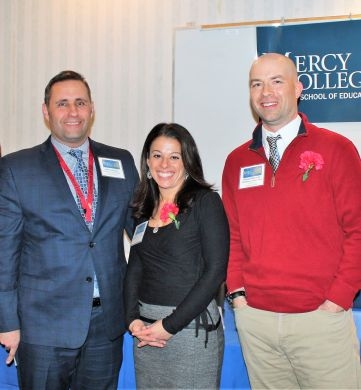
As part of the program, Fellows will engage in intensive learning and professional development experiences that will prepare them as STEM teacher leaders. All Fellows are currently teaching K-12 science or math in one of the four partner, high-needs school districts. “Each member of the cohort is already an asset to their schools,” said Amanda Gunning, PhD, Associate Professor of Secondary Science Education and Chair of the Division of Secondary Education. “Our program helps them become even more valuable. That’s why districts are sending their best teachers—to help them support change in the district by training others and advocating for STEM.”
Historically, teachers who wanted to have a big impact on their districts were usually promoted to positions in administration, meaning they would no longer teach. Alternatively, such teacher leaders moved to other districts to find jobs more suited to their advanced training and skills. “This Mercy program keeps great STEM teachers in the classroom where their greatest strengths can continue to develop and make the most impact,” said Gunning. “Our own educational research has shown that teachers who are enriched through targeted professional development not only grow and excel in their classrooms but are also able to effect important change in their districts.”
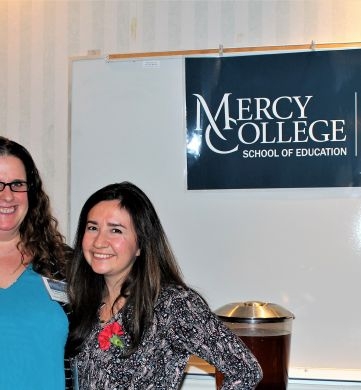
The January recognition ceremony on the Dobbs Ferry campus served a dual purpose: to introduce the new cohort of Fellows to the Mercy community and to create a climate of enthusiasm and support for the initiative. “We want the community to understand the advanced role Mercy has undertaken, one that will shape the STEM education of our local schools,” said Gunning. “We hope the community sees the College as a go-to resource whenever there are plans to expand and support STEM teaching in their schools.”
Each cohort of STEM Teacher Fellows will be supported by mentor faculty from the School of Education (Drs. Marrero and Nitecki), Biology (Dr. Haskew-Layton) and Math (Dr. Ben-Jacob) departments, and by resources and guidance from the Center for STEM Education. Working with education partners Sarah Lawrence College’s Center for the Urban River at Beczak (with a focus on environmental science), and New York University's Tandon School of Engineering (focusing on engineering and robotics), Fellows will receive rich, authentic learning experiences and professional development.
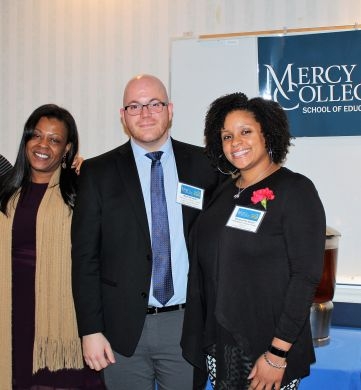
New York State has identified a critical need for highly effective math and science teachers for K-12 students. Even more critical is the need for programs that can be delivered to high-need school districts where underrepresented students suffer from the lack of highly qualified science and math teachers. Responding to this need, Mercy College School of Education recently registered a new Advanced Teaching Certificate for STEM Education. The fellowship program takes advantage of this additional coursework and is aimed at preparing the new cohort to become leaders in their districts.
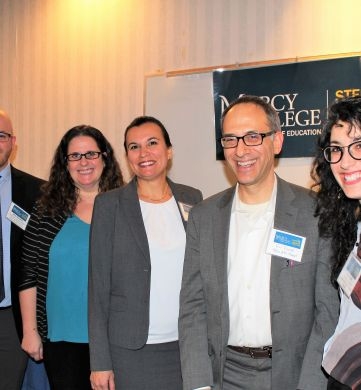
“By the end of the fellowship period, these pioneering teacher leaders will be extremely well-versed in real-world STEM issues and grounded in best practices they can use to lead other teachers in improving STEM teaching and learning,” said Gunning. Other goals include improving student motivation, achievement and possible careers in math and science in districts where such achievement can be elusive. “We hope to contribute significantly to the growing number of teachers who are not only equipped to take on STEM leadership roles within their schools, but who will also remain in their high-need districts to keep the momentum going,” added Gunning.
For more information, visit the Fellowship site: https://www.mercy.edu/education/specialized-programs/center-stem-education/master-teacher-fellows
